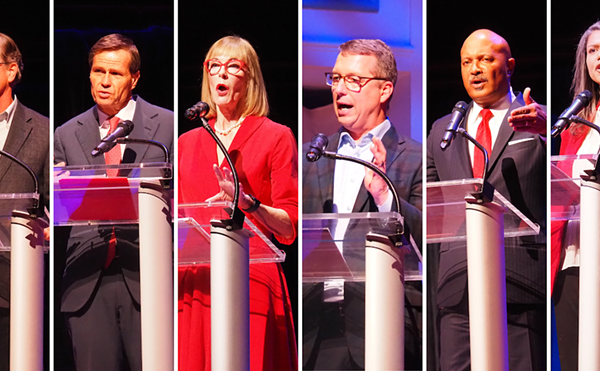Thanks to Ken Burns' recent Jazz series on PBS, the Blue Wisp is once again a very hot ticket. When I was there recently to hear Cal Collins with the Phil DeGreg Trio, the place was packed with an elegant audience wearing everything from miniskirts to Armani tuxes. Young, glamorous people were listening, by candlelight, to "grown-up" music.
I looked at Marjean Wisbe, the club's owner, who looked up from her aquarium of tropical fish. I raised my eyebrows, and she raised hers back. It looked like a good night.
Bob Bodley was playing bass, and I was momentarily transfixed, listening to him throw out a shower of notes, followed by deep, silent spaces. Years ago, when I first sang on that stage with this trio, I could have sworn I felt electricity pass through Bodley to the piano player and then on to drummer Art Gore. "The bass is the earth," he said to me one night.
Bodley, now in his prime as a musician, is one of the "first-call" bass players in town.
He spent 14 years working and living in New York, playing with some of the seminal figures in the music, but he came back home in 1990. The transition, he said, was easy.
"Nothing much had changed," he says, laughing.
He's a tall man, slender with a face like an Indian's face, with high cheekbones and a full head of light brown hair, cut Beatles' style. His complexion is ruddy, like a countryman's. He has callused fingers, but he can still roll a cigarette one-handed.
Bodley isn't only cool — he's Clint Eastwood material. "You dig?," he always says, and we do.
The pianist Steve Schmidt said of him, "Bob Bodley is a great bass player. He understands music from the bottom to the top. He understands the right bass note to play against the soloist, and he understands the middle voices as well as the melody."
Schmidt laughed a little. "I can be on a gig with him and forget the exact melody, and Bob is the only bass player I know who can sing it or play it for me. And you can hear it in his solo playing. When it's time for him to step up, he is a melodic soloist."
"In the 1950s," Bodley tells me, "these guys would come around and give you an accordion if you paid for and finished 20 lessons. You paid for the lessons, and if you learned to play the instrument, you got to keep it."
He did both. Just as he learned the E-flat lap tuba, a Dixieland horn, at Moeller High School. It was there — in fact, in the band room — that he picked up a discarded Kay upright bass, with only two strings, put some new "wires" on it, as we say in Bluegrass, adjusted the bridge, cleaned it up a little and started playing gigs.
"I played my first gig when I was 15, and I just never stopped," he says. "You dig?" I nod. We're talking quietly in the band room at the Wisp. "I was playin' bass, doing weddings, club dates, but I was still just 'two-fingering' it, really. Then I met Dee Garrett when Dee Felice was playing at the Buccaneer. He turned me on to Jazz, to the repertoire, the changes, and concurrently I took some bass lessons. Eventually I met Ed Moss and started to hang there at the Golden Triangle. That was a six-night-a-week gig, too.
Like many "serious" local artists, Bodley eventually moved to New York. He found work, sublet an apartment and figured he'd better try it while he could. He ended up working there for 14 years.
"The best thing about New York," he says after a pause, "was that somebody like Miles Davis was your neighbor."
He worked with Woody Herman's band, toured and recorded with Art Farmer, toured with Lionel Hampton and worked with pianists Dave Friedman, Horace Silver and Mose Alison. Some time in the '80s, he says, the scene in New York started drying up and for a while New York was dangerous. He came back home in 1990 and hasn't stopped playing.
I ask him about that original accordion. "How'd you know you could learn it?"
"Just did," Bodley says. "Those little black buttons on the side? They represent the circle of fifths and extensions to the circle of fifths. It's cool. I liked playing the accordion.
"Anyway, that was the deal: You gotta pay for the hang. You dig?"





